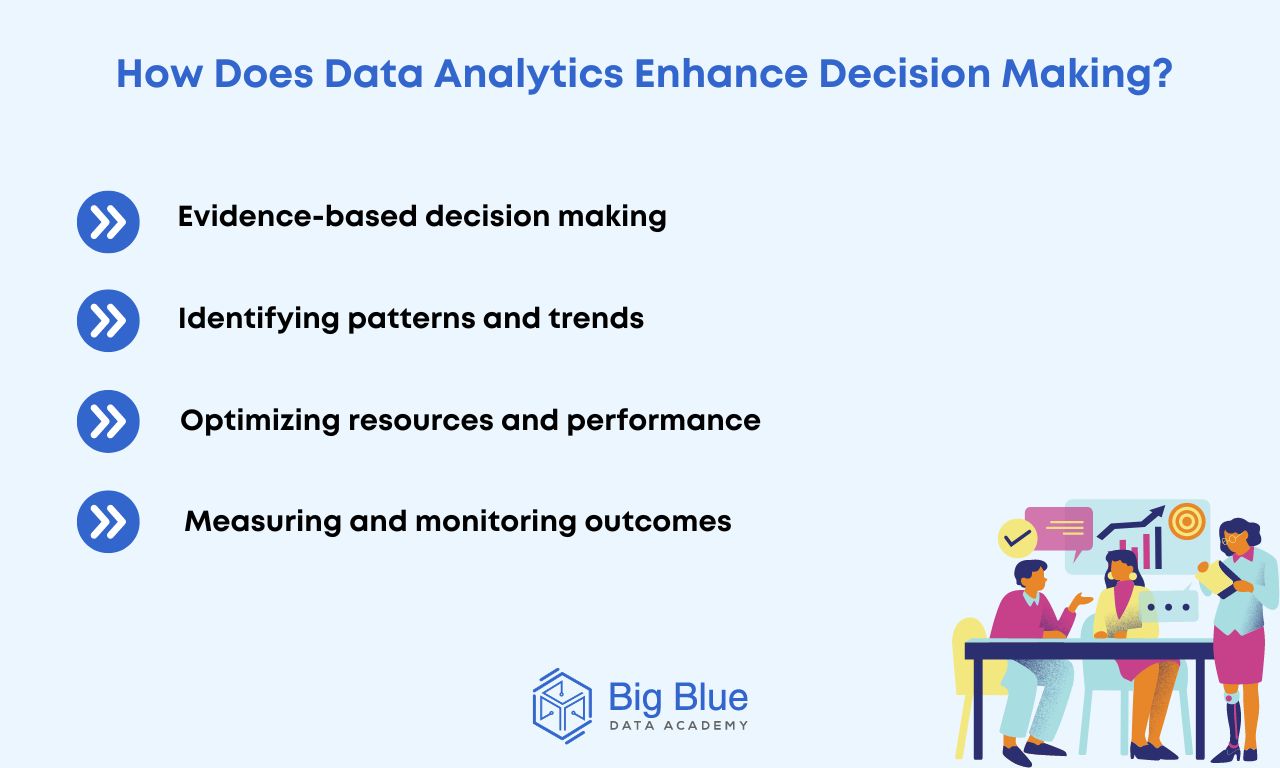How Does Data Analytics Enhance Decision Making?
Over time the complexity and size of data and its sources is constantly increasing. Analyzing large amounts of data is a critical process for identifying patterns and insights across a wide range of disciplines.
In particular, today's businesses using data analytics can gain a deeper understanding of operations, customers, and market trends, which can inform better decision-making.
So in today's guide, we will see in detail:
- What is the role of data analysis in business decision-making
- What are the main types of data analytics used to improve business decisions
Let's start.
How Does Data Analytics Enhance Business Decision Making?
Data analytics can improve business decision-making in the following ways:

Evidence-based decision making
Data analytics can help businesses make efficient and methodical data-driven decisions, reducing the risk of making decisions based on guesses or other more subjective criteria.
Data analysis provides businesses with the objective and reliable information they need to make informed decisions that lead to business growth and further development, standing out from the competition.
Identifying trends and patterns
Data analysis helps businesses identify trends, and patterns, and better understand their customers and market.
By analyzing big data, a company operating in e-commerce, for example, can analyze sales figures and data to determine which products are selling the most, which can inform inventory and merchandising decisions.
Optimizing resources and performance
By analyzing complex data, businesses and organizations can improve and enhance their operational efficiency and resources.
By analyzing the data, businesses can identify inefficiencies in their operations and take steps to streamline processes, reduce costs, and improve productivity.
In this way, they increase the chances of enhanced profitability and business success.
Measure and monitor results
Through data analysis and the use of KPIs, businesses can measure and monitor the results of their actions, such as in the case of a marketing campaign.
By analyzing the data, businesses can identify new markets, customer segments, and products or services that have high growth potential, and then leverage that information to inform their strategic planning and investment decisions.
So after talking about the role of data analytics in making business decisions, let's see what are the 3 main types of data analytics used for this purpose.
3 Basic Types of Data Analytics Used to Improve Business Decisions
The 3 main types of data analytics used to support business decisions are as follows:

Type #1: Descriptive analytics
Descriptive analytics serves as the fundamental level of data analysis.
This type of data analytics is about scrutinizing historical data to understand events that happened in the past.
Descriptive analysis helps visualize trends and patterns in data to assess the current situation and identify opportunities.
Type #2: Diagnostic analytics
Continuing, diagnostic analytics goes a step deeper into why specific events or trends occurred, based on the data.
Its main purpose is to find the root causes of specific outcomes by identifying the factors that led to a specific event.
Using diagnostic analysis, organizations can take corrective action and make more informed decisions in the future.
Data visualization tools commonly used in diagnostic analysis are Tableau and Power BI.
Type #3: Predictive analytics
Predictive analytics focuses on predicting future events or trends by leveraging historical data to create models that can make predictions about what is likely to happen.
In this type of analysis, machine learning algorithms as well as statistical modeling are used.
By leveraging predictive analytics, businesses can predict customer demand, predict churn, and even detect fraud.
In a Nutshell
Modern organizations and businesses are constantly looking for effective ways to improve their strategic planning and decision-making processes.
By analyzing data and using specific tools, businesses can "translate" raw data into valuable information and thus make informed and strategic decisions.
So if you're involved in this subject and want to enrich your knowledge, read more related articles on our blog!


.jpg)